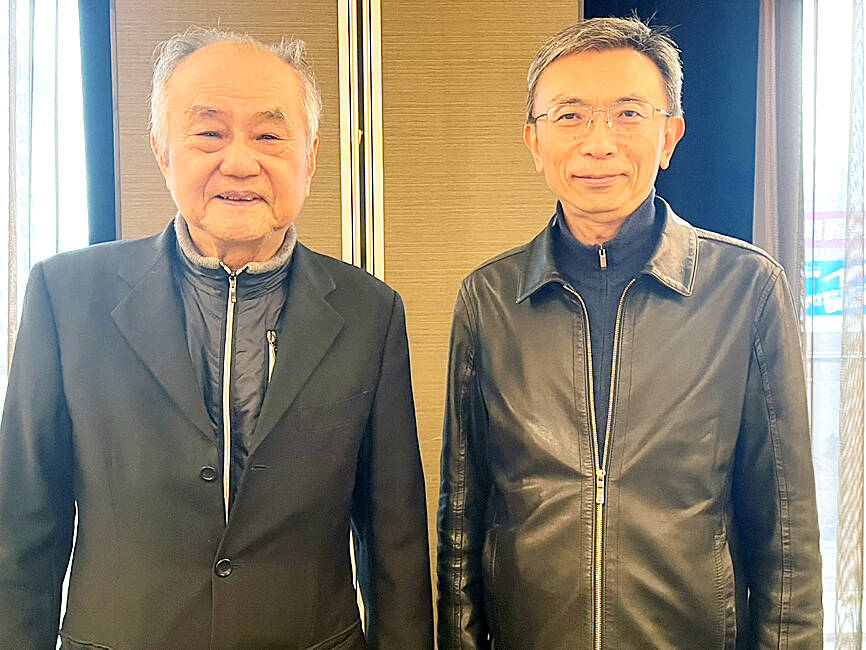Chip tester King Yuan Electronics Co (京元電子), which counts Nvidia Corp as a key customer, yesterday said it is mulling whether to build a new production line in the US in response to strong testing demand for chips used in artificial intelligence (AI) and high-performance computing (HPC).
The remarks came after Taiwan Semiconductor Manufacturing Co (TSMC, 台積電) unveiled a new US$100 billion US expansion plan, including two advanced packaging fabs, to address demand from its US clients and potential tariffs.
“That [US expansion] needs to correspond with the development of market conditions. We will be preparing for that,” King Yuan chairman Lee Chin-kung (李金恭) told reporters on the sidelines of a media gathering in Hsinchu.

Photo: CNA
King Yuan said that US President Donald Trump’s plan to hike tariffs poses great uncertainty to the whole semiconductor industry.
It is hard to gauge the impact as of the present, it said.
King Yuan is one of the key back-end assembly partners to TSMC for its advanced packaging, or chip-on-wafer-on-substrate, technology, which is primarily adopted for AI chips. The firm provides final test and burn-in test services for TSMC and Nvidia.
Apart from the US, King Yuan has also included Southeast Asian nations on its shortlist as the region has risen to be a major global semiconductor hub.
King Yuan expects AI-related revenue to account for more than 20 percent of its total revenue this year, Lee said.
That would be a spike from a single-digit percentage revenue contribution last year.
The company has a positive revenue outlook for this year and expects demand for advanced technologies to outpace mature technologies, King Yuan president Gauss Chang (張高薰) said.
A majority of the company’s customers in the consumer electronics segment have reduced their inventory to a healthy level, which would help drive growth, while customers in the automotive segment are still digesting excessive stockpiles, he said.
“Based on the normal seasonality, the first quarter is usually a low season,” Chang said. “The second quarter will be a better period than the first, followed by a strong second half fueled by AI and HPC demand.”
To cope with the dramatic increases in AI-related demand from customers, King Yuan has rented a factory in Miaoli County’s Toufen City (頭份) and is building a clean room and preparing for new equipment to move in, Chang said.
The firm is also building a new fab in Miaoli County’s Tongluo Township (銅鑼), he said.
King Yuan has budgeted for record-high capital expenditure of NT$23.3 billion (US$709.2 million) this year, an increase of 68 percent from NT$13.8 billion last year.

WEAKER ACTIVITY: The sharpest deterioration was seen in the electronics and optical components sector, with the production index falling 13.2 points to 44.5 Taiwan’s manufacturing sector last month contracted for a second consecutive month, with the purchasing managers’ index (PMI) slipping to 48, reflecting ongoing caution over trade uncertainties, the Chung-Hua Institution for Economic Research (CIER, 中華經濟研究院) said yesterday. The decline reflects growing caution among companies amid uncertainty surrounding US tariffs, semiconductor duties and automotive import levies, and it is also likely linked to fading front-loading activity, CIER president Lien Hsien-ming (連賢明) said. “Some clients have started shifting orders to Southeast Asian countries where tariff regimes are already clear,” Lien told a news conference. Firms across the supply chain are also lowering stock levels to mitigate

NEW PRODUCTS: MediaTek plans to roll out new products this quarter, including a flagship mobile phone chip and a GB10 chip that it is codeveloping with Nvidia Corp MediaTek Inc (聯發科) yesterday projected that revenue this quarter would dip by 7 to 13 percent to between NT$130.1 billion and NT$140 billion (US$4.38 billion and US$4.71 billion), compared with NT$150.37 billion last quarter, which it attributed to subdued front-loading demand and unfavorable foreign exchange rates. The Hsinchu-based chip designer said that the forecast factored in the negative effects of an estimated 6 percent appreciation of the New Taiwan dollar against the greenback. “As some demand has been pulled into the first half of the year and resulted in a different quarterly pattern, we expect the third quarter revenue to decline sequentially,”

Six Taiwanese companies, including contract chipmaker Taiwan Semiconductor Manufacturing Co. (TSMC), made the 2025 Fortune Global 500 list of the world’s largest firms by revenue. In a report published by New York-based Fortune magazine on Tuesday, Hon Hai Precision Industry Co. (better known as Foxconn) ranked highest among Taiwanese firms, placing 28th with revenue of US$213.69 billion. Up 60 spots from last year, TSMC rose 60 places to reach No. 126 with US$90.16 billion in revenue, followed by Quanta Computer Inc. at 348th, Pegatron Corp. at 461st, CPC Corp., Taiwan at 494th and Wistron Corp. at 496th. According to Fortune, the world’s

DIVERSIFYING: Taiwanese investors are reassessing their preference for US dollar assets and moving toward Europe amid a global shift away from the greenback Taiwanese investors are reassessing their long-held preference for US-dollar assets, shifting their bets to Europe in the latest move by global investors away from the greenback. Taiwanese funds holding European assets have seen an influx of investments recently, pushing their combined value to NT$13.7 billion (US$461 million) as of the end of last month, the highest since 2019, according to data compiled by Bloomberg. Over the first half of this year, Taiwanese investors have also poured NT$14.1 billion into Europe-focused funds based overseas, bringing total assets up to NT$134.8 billion, according to data from the Securities Investment Trust and Consulting Association (SITCA),